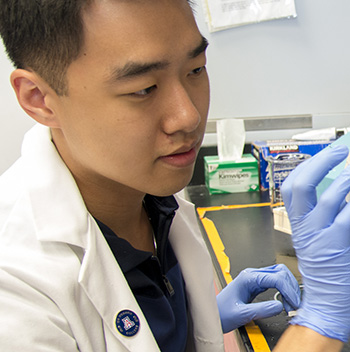 Stephen Yao is a fly guy. A Drosophila melanogaster guy, to be exact. Working in MCB Professor Daniela Zarnescu’s lab for nearly four years as an undergraduate, Yao has learned a lot about the power of the fruit fly as a model organism, one that has helped the Zarnescu lab elucidate the mechanisms of neurodegenerative disease.
Stephen Yao is a fly guy. A Drosophila melanogaster guy, to be exact. Working in MCB Professor Daniela Zarnescu’s lab for nearly four years as an undergraduate, Yao has learned a lot about the power of the fruit fly as a model organism, one that has helped the Zarnescu lab elucidate the mechanisms of neurodegenerative disease.
Yao, a Beckman Scholar who is passionate about biology, is preparing to graduate this May. He recalls how he first decided to major in MCB, “MCB 181 got me hooked! Biology was always something I was fascinated with, but I got a lot more exposure in college, and I decided freshman year that I wanted to join a lab.”
Yao had participated in SARSEF (Southern Arizona Research, Science and Engineering Foundation) science fairs throughout middle school and high school and had honed in on science or engineering as a path forward. He chose to enroll at the University of Arizona because of its strengths in these areas.
“I had all of these connections at UA, and a lot of professors would help judge at the science fairs, they were very involved,” he explains. One of these connections was Zarnescu, whom Yao met during his senior year at University High School.
Yao and Zarnescu have been working together ever since. Zarnescu welcomed Yao into her lab during his first semester, and he started out shadowing undergraduate and graduate students and getting a feel for lab techniques and the atmosphere of working in a laboratory. Soon, he got hands-on experience and developed an appreciation for the research environment.
“The university environment is very collaborative, you’re not just told what to do,” Yao explains. “It teaches you how to come up with the right questions.”
Although it’s a supportive environment, research as an undergrad can be intimidating at times, according to Yao, and he emphasizes that asking questions is key. “There are a lot of methods and terminology, and it’s a steep learning curve at first—you learn a lot,” he advises. “Ask for papers or read a lot of papers—it’s one of the ways of getting over the barrier of not being able to understand the terminology.”
Yao asked a lot of questions, and it paid off. His sophomore year, he was selected for the prestigious Beckman Scholar program, which provided two years of support (2016-2017) while requiring research time during the school year and summers.
“As part of the program, you go to a conference each of the two summers—it was remarkable,” Yao enthuses. “The first year, you see other peoples’ projects, and the second you present your project. It’s great to talk to people working in different areas and share your work.”
With the support of the Beckman program and Zarnescu, Yao has had the opportunity to travel to several conferences, including the Society for Neuroscience Annual Conference and the Drosophila Research Annual Conference.
“Daniela encourages everyone in her lab to travel and learn at conferences if possible,” Yao points out. “It’s part of the research experience—not only do you run a project and do lots of experiments, you have to be able to talk to others about it, to relate why the research is important.”
Yao credits his lengthy research experience with giving him a more in-depth understanding of MCB material.
“My junior and senior year, I started working on projects mentoring other people, helping them learn techniques,” Yao explains. “I now get asked a lot of questions. Research gives you a very deep understanding of the concepts you learn in class, so you can answer the questions.”
While Yao is passionate about biology, he has successfully maintained other interests, double-majoring in East Asian Studies, honing his Chinese language skills, and keeping up his love of music with gigs playing violin, piano, and guitar with friends.
“We play at someone’s house, or a church or retirement community,” says Yao, who is taking his own advice to get outside your comfort zone. “Don’t be afraid to try new things,” he encourages fellow students, while filling out his own application to teach English in Taiwan as a Fulbright Scholar. “College is definitely a time to test your boundaries and find out what you like.”
Yao has decided to take his passion for biology and apply it to medicine. He is hoping to start medical school in 2019, after a year of teaching or research. As a doctor, Yao hopes to continue being involved in research.
“Research is unstructured and there isn’t anyone who is going to tell you the right answer. You get to work with a lot of smart, motivated people,” Yao says. Sitting forward in his seat, he adds, “It’s a very rewarding experience to think that the research you’re doing will change the lives of people in the future.”
As he leans forward into life after college, we expect the lessons of the lab will take Yao far.





